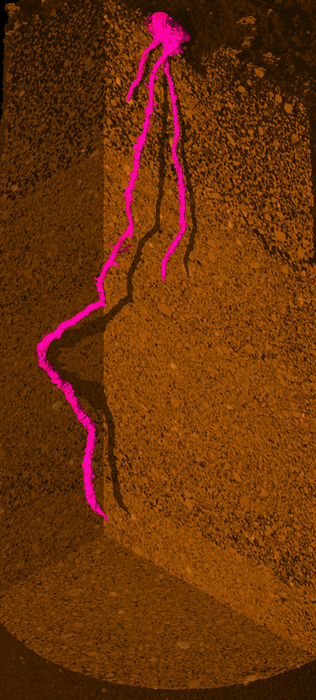Scientists have discovered how to design cereal roots able to continue growing in hard soils by altering their ability to penetrate, enabling roots to access sources of water deeper in soil, and helping ‘climate-proof’ vital crops in response to changing UK rain fall patterns.

Credit: Dr Bipin Pandey, University of Nottingham
Scientists have discovered how to design cereal roots able to continue growing in hard soils by altering their ability to penetrate, enabling roots to access sources of water deeper in soil, and helping ‘climate-proof’ vital crops in response to changing UK rain fall patterns.
Climate change is altering rain fall patterns, resulting in drier, harder soils which threaten yields in rain fed crops like cereals. An international team of researchers led by the University of Nottingham and Shanghai University have discovered key genes, hormone signals and processes in rice roots that control their ability to penetrate hard soils. Their findings have been published today in the scientific journal Proceedings of the National Academy of Sciences.
Hard soils cause crop roots to grow shorter and swell. Root swelling was originally thought to help penetrate hard soils. However, X-ray imaging of plants growing in soil at Nottingham revealed that roots which remained narrow penetrate hard soils more easily. The team went on to identify a hormone signal that promoted this root swelling response which, when its levels were reduced, helped roots remain narrow and penetrate hard soil more effectively.
Dr. Bipin Pandey, BBSRC Discovery Fellow and the lead researcher from the University of Nottingham says “Our research overturns decades of scientific thinking, revealing that root swelling does not help penetrate hard soils. These results can potentially safeguard or boost agricultural yields worldwide, particularly considering that climate change can exacerbate the strength of soil by less rainfall. This new understanding of how roots grow in hard soils promises to help develop novel soil-compaction-resistant crops.”
The international team includes researchers from the UK, USA, Netherlands, Germany, Czech Republic and China. The Nottingham team was funded by BBSRC Discovery Fellowship, European Research Council, Royal Society and University of Nottingham Future Food Beacon awards.
Journal
Proceedings of the National Academy of Sciences
DOI
10.1073/pnas.2201072119
Method of Research
Experimental study
Subject of Research
Not applicable
Article Title
Ethylene inhibits rice root growth in compacted soil via ABA and auxin mediated mechanisms
Article Publication Date
18-Jul-2022




